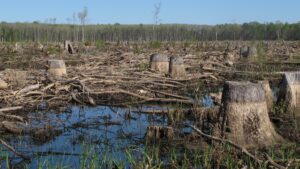Forest Monitoring Law: why an EU-wide framework is crucial for understanding our forests
Written by Riccardo Gambini and Erica Gentili – Cover picture by Lars Soerink
Following the European elections, discussions about the European Commission’s proposal to establish a common monitoring framework for resilient forests, the Forest Monitoring Law (FML), are gradually resuming. Member States are currently debating the proposal in the Agriculture and Fisheries Council. While some governments are concerned about the proposed law’s added value and scope, it’s important to emphasise why a common, harmonised, and comprehensive monitoring system is essential for addressing forest-related challenges.
Improve data collection and comparability
Member States periodically produce National Forest Inventories (NFIs) to gather data on the status of their forests. However, this data tends to be fragmented and overly focused on economic variables, often neglecting the environmental and social aspects inherent to forest ecosystems. Furthermore, while forests do not recognise borders, data often does. Information collected nationally by countries is frequently incomparable, even between geographically close neighbours. This is due to differences in definitions and methods used. A robust EU-wide framework would establish a broader list of common indicators and agreed-upon definitions, making reporting more comprehensive and efficient. It would build on existing national data and expand it to adopt a more EU-focused, ecosystem-based approach.
Support reporting requirements from other EU legislation
Forests play a key role in many areas covered by EU law, including nature conservation, land use, energy, climate, and trade. The FML presents an opportunity to create a centralised system for all collected data and streamline reporting obligations across existing legislation. In some cases, the FML could even close legislative gaps and supplement vague reporting requirements set out in other policies.
Encourage integrated forest planning
Some Member States oppose the inclusion of long-term plans in the FML, though this measure is voluntary, as EU countries already have the option to opt-out. Nevertheless, conducting this planning exercise would support the development of an integrated, data-driven approach to forest management. This would also create synergies with other requirements, such as Nature Restoration Plans and National Energy and Climate Plans. Long-term plans would help Member States manage forests more effectively by minimising trade-offs between different objectives and balancing competing forest uses. As forests face increasing pressures and changes due to climate change, the FML could encourage Member States to adopt a more holistic vision. By considering key ecological aspects beyond the traditional focus on wood production, this framework would ensure a greater emphasis on other ecosystem services in monitoring and planning.
Harness Technology to Ensure Cost-Effectiveness
Forestry contributes around €25 billion (0.17%) of Gross Value Added in the EU. The broader ecosystem services provided by forests, such as carbon sequestration, flood control, water purification, and recreation, are valued at €67 billion per year[1]. The monitoring procedures outlined in the FML, which combine both remote sensing technologies and on-the-ground observations, would ensure cost-effectiveness and accuracy. Implementing the FML is expected to result in financial and non-economic benefits for various stakeholders, including land managers, the EU digital industry, citizens, and society at large.
Contribute to Transparent and Accessible Data
The FML can help increase access to environmental information. As mentioned earlier, NFIs often provide very general and incomplete data. The proposed monitoring framework would contribute to developing a single, trustworthy platform where timely data is readily available to all stakeholders. Although the level of detail will vary for each indicator and mapping will respect privacy and property rights, EU countries should always aim for the highest possible level of geographical detail to support effective management.
You can read the full “NGO paper: the benefits of a Forest Monitoring Law” at this link.
[1] European Environment Agency (EEA), Eurostat & European Commission (EC). Accounting Forr Ecosystems and Their Services in the European Union – Final Report from Phase II of the INCA Project Aiming to Develop a Pilot for an Integrated System of Ecosystem Accounts for the EU. (2021).




